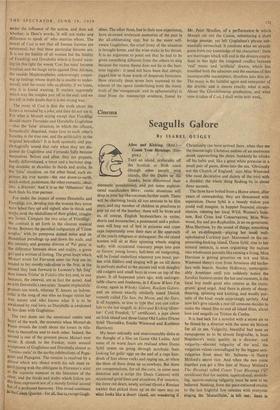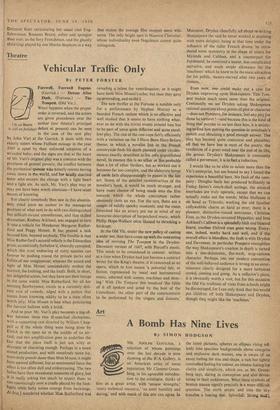Cinema
Seagulls Galore
By ISABEL QUIGLY Alive and Kicking. (Ritz.)— Count Your Blessings. (Em- pire.)
TAKE an island, preferably off the Scottish or Irish coast (though other people with islands, like the Danes or the Greeks, have discovered their cinematic possibilities), and put some sophisti- cated mainlanders there: comic situations will drop in your lap like coconuts farther south. There will be charming locals all too anxious to be film stars, and any number of children in pinafores to pop up out of the heather; there will be birds and so, of course, English birdwatchers in eyries, shorts and moustaches; a postmaster and a police- man will leap out of bed in pyjamas and cram caps importantly over their ears at the approach of the yearly telegram or delinquent; the old island women will sit at their spinning wheels singing sadly, with occasional visionary peeps into past or future; young lovers, hell-bent on emigrating, will be found underfoot wherever you tread; par- ties with fiddlers and singing will go on till dawn in parlours stuffed to the picture rail with doughty old codgers and small boys in rows on top of the piano. It all happened years ago, with unforget- table charm and freshness, in I Know Where I'm Going; again in Whisky Galore, Rockets Galore, and an almost exactly similarly toned Danish comedy called The Sun, the Moon, and the Stars. It all happens, so true to type that you can calcu- late to the last seagull, in Alive and Kicking (direc- tor: Cyril Frankel; 'U' certificate), a jape about an Irish island and three Game Old Ladies (Dame Sybil Thorndike, Estelle Winwood and Kathleen Harrison).
My heart unkindly and unaccountably sinks at the thought of a film on Game Old Ladies. And some of its worst fears are realised when Dame Sybil insists on going through acrobatic feats looking for gulls' eggs on the end of a rope hun- dreds of feet above rocks and raging sea, or when the three of them dress up as cowboys. But there are compensations, for 'all the corn, in some neat direction and a script (by Denis Cannon) with occasional good lines and situations. For instance, the three old dears, newly arrived (from a Russian trawler that picked them up on the open sea) on what looks like a desert island, are wondering if Christianity can have arrived there, when they see the reassuringly Christian outline of an enormous monk approaching the shore. Suddenly he whisks off his habit and, like a great white porpoise in a small pair of pants, dives into the sea. 'Obviously not the Church of England,' says Miss Winwood (the most decorative and dainty of the trio) with a shudder, the whole thing flashing by in about three seconds.
The three have bolted from a Home where, after years of comradeship, they are threatened with separation. Dame Sybil is a tweedy widow you could well imagine, in happier financial circum- stances, running her local WVS, Women's Insti- tute, Red Cross and Conservatives; Miss Win- wood, fey and pre-Raphaelite, is an ex-governess; Miss Harrison, by the sound of things, something of an ex-delinquent—playing her usual well- upholstered Cockney part. Marooned on the un- promising-looking island, Dame Sybil, true to her natural instincts, is soon organising the natives into wholesome pursuits like earning a living,-Miss Harrison is getting groceries on tick and Miss Winwood sheep's eyes from ferocious old bache- lors with beards. Stanley Holloway, unrecognis- ably American until you suddenly notice the familiar features under the hat and manners, is the local boy made good who returns as the immi- grants' good angel. And there is plenty of sheep- shearing, spinning and knitting, and woolly pur- suits of the kind, made surprisingly spritely. And now let's give islands a rest till someone decides to make the island film to end all island films, about love and seagulls on Tristan da Cunha.
It is bad luck for a novelist with a secret sin to be filmed by a director with the same sin blatant for all to see. Vulgarity, beautiful bad taste so rampageous as to be almost forgivable, is Jean Negulesco's main quality as a director; and vulgarity—discreet vulgarity of the soul, the vulgarian values camouflaged by the biggest anti- vulgarian front since Mr. Salteena—is Nancy Mitford's secret vice. And when the two come together you get a film (out of Nancy Mitford's The Blessing) called Count Your Blessings ('U' certificate) that for outsize, supercolossal, screech- ing, squirm-making vulgarity must be seen to be believed. Nothing, from the puce-coloured credits to the last frightful few minutes with everyone singing the `Maxseillaise; is left out: there is Deborah Kerr caricaturing her usual cool Eng- lishwoman, Rossano Brazzi, softer and spongier than ever, as the fiery Frenchman, and the ghastly child Gigi played by one Martin Stephens in a way that makes the average film moppet seem win- some. The only bright spot is Maurice Chevalier, whose individuality even Negulesco cannot quite extinguish.







































 Previous page
Previous page